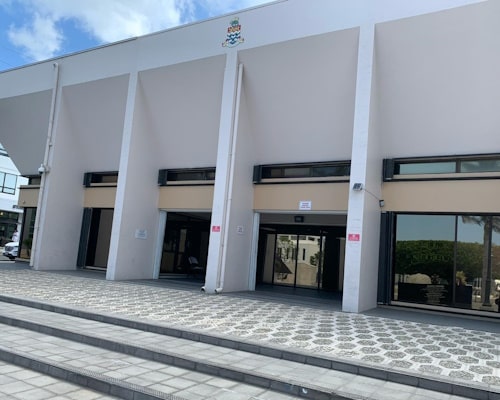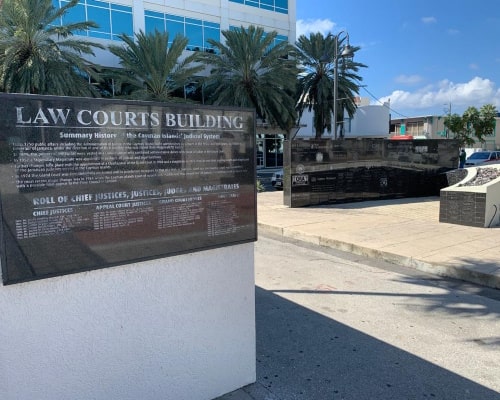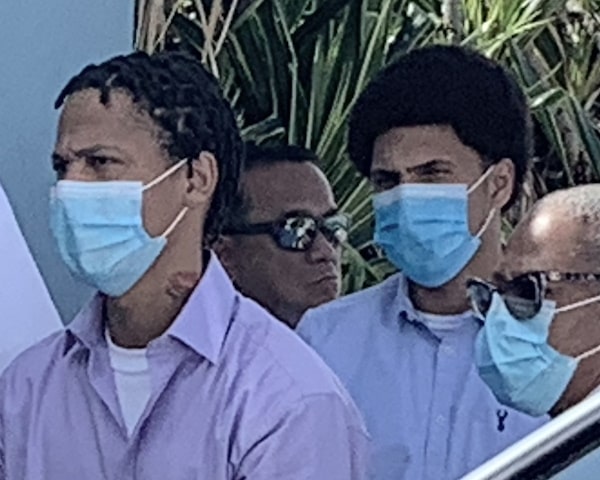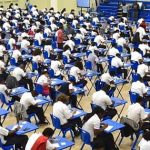MLAs push for more education cash
(CNS): More than $145 million has been allocated to education in the 18-month budget, accounting for around 17% of the government’s entire 2016/17 spending plan, but opposition MLAs and the education minister pressed for more yesterday, when concerns were raised about failing schools identified in last year’s damning school inspections. Pulling the $2.5 million budgeted for private schools and cutting the surplus were suggested as ways to boost school spending. However, Finance Minister Marco Archer rejected the suggestions and offered to find cash from other ministries over the course of the financial year to transfer to education.
As Archer, the Finance Committee chair, concluded the vote for the Ministry of Education, Employment and Gender Affairs’ budget at around 10pm Monday night, he said that education spending was a significant part of the overall spending plan, second only to national security.
He said that “anyone thinking it wasn’t a priority” was wrong as government had spent a long time discussing education spending and had paid close attention to the funding the needs. But he said he was committed to reviewing spending again, once the budget was steered through, with the aim of moving money around after the fact via a section 11 transfer.
When Finance Committee resumed Tuesday morning, lawmakers on the opposition benches were falling over themselves to demand more cash be spent on education, pointing to the inspections conducted last year that painted a bleak picture for kids in the public school system. Education Minister Tara Rivers implied that she had asked for a larger share of the public pie but, like most ministries, she didn’t get everything she wanted.
“I asked for a budget and we got what we got and I am not the only minister that didn’t get everything I asked for,” she noted. She said she would continue to advocate where possible for education spending but the issues raised by the inspections were beginning to be addressed and the ministry would tackle the issues within the spending budget it was given.
Anthony Eden (Bodden Town) said he was “begging and pleading” for more resources to close the gaps, as he implied the education system was in crisis. Alva Suckoo said lawmakers should all agree to invest more and proposed that “someone in government” should look to reallocate resources, but he had no suggestions for the finance minister when asked where the extra money should come from. The Bodden Town MLA said he was now in opposition and not in a position to make those decisions or presume to tell government what to do.
However, Opposition Leader McKeeva Bush was more than happy to tell government what to do, suggesting that, given the size of the surplus, Archer could take $2 million from that and, if he needed the FCO’s permission, he should write to them and point to the education needs.
Ezzard Miller (North Side) urged government to use the $2.5 million given to private schools by the public purse instead, and when it came to the vote, he was the only MLA to oppose public cash going to private education institutions. Both Premier Alden McLaughlin and the opposition leader disagreed with that idea, claiming that small struggling schools would close without government support, but they helped keep education costs down in the long run by reducing the number of students in the public system.
Archer pointed out the challenges of reallocating resources and said that Finance Committee was not the best place to start cutting money. He urged his colleagues to give the government time to scrutinise the spending plan further once the budget was in place and see if cash could be transferred later.
While Bush pointed out that parents were resorting to online petitions to get resources, the premier said allocation across the education system had to be equitable and certain schools could not get more “because they had the best lobbyists”.
As education officials spoke about the plans and changes over the short-, medium- and long-term to address the problems, the debate about failing schools raged for most of the day, as opposition members pressed for cash for their schools.
They quizzed the minister and staff about teaching, the need for more special education experts, reviews of grades and tests, reading standards, uniform policies and more. Rivers stated that after receiving the baseline inspection reports, a plan of action was developed and rolled out at the beginning of this academic year aimed at strengthening school leadership and increasing accountability.
Although resources for more teachers and support staff was highlighted as important, the social problems impacting children were also raised. Education challenges were not the only issues that need attention and one official from the ministry specialising in behavior revealed that there are some very young children facing very serious problems.
She confirmed that children as young as seven and eight years old were being excluded or separated from mainstream education as they posed a genuine threat to other children. The official pointed to an “increasing number of very young children suffering from profound behavioural problems and mental health issues”.
Christian Suckoo, the chief officer in the ministry, said that despite the challenges over resources, the education system had never before done as much as it is doing today but said the Cayman Islands would not see the benefits for many years. Although there was a solid plan in place, it wasn’t perfect, he said.
Urging MLAs to be patient, he said, “Now we have a plan, but it is only two years old.”
East End MLA Arden McLean said he did not have to be patient because the last time he heard that was when Truman Bodden was the minister responsible for education, but it didn’t work. He suggested that every education minister has come with a plan, which was to change whatever the one before had done.
“This has been happening since before I was elected. I need to see something work. I can’t have patience.”
Category: Education, Government Finance, Politics





































“Ezzard Miller (North Side) urged government to use the $2.5 million given to private schools by the public purse instead, and when it came to the vote, he was the only MLA to oppose public cash going to private education institutions. Both Premier Alden McLaughlin and the opposition leader disagreed with that idea, claiming that small struggling schools would close without government support, but they helped keep education costs down in the long run by reducing the number of students in the public system.”
I applaud Mr. Miller for his stand on this. I would like to suggest, however, that the system of subsidy to private schools be completely changed in its objective. What should happen in reality, is that this subsidy be given in the form of scholarships to the high performing students from government schools. There are many students in the government’s ‘failing system of education’ who could do so much better if they could afford some of the exorbitant fees levied by the private schools. It is a fact that the private schools are managing to offer a superior education at lower cost than what the government does. Although, we may see it that government education is FREE it most certainly is NOT. It costs the government approximately $20,000 per student in the primary schools and that escalates when it gets to the high school level. So my point is that students in the government schools who show the potential, could be given scholarships to get into the (and I will say it) the superior private schools. This should be a very competitive process, thereby stimulating best efforts. This is nothing new – way back when, the common entrance exams were administered at the end of primary schools, the top performers were granted scholarships to go to the better schools. This system exists in most countries in our region. Examinations are taken seriously, where parents will invest in private tutoring for extra lessons, in order to help their child get good passes so they can get scholarships to the best education available.
If the 2.5 million in subsidy is used, via the scholarship programme, then let’s say $10,000 per student that would see 250 students from across the Cayman Islands getting into the ‘Ivy league’ high schools in Grand Cayman. I would give that my FULL support and I believe that MLA Ezzard Miller would do so as well.
More cash is always the answer yet Cayman schools get more money than those of the USA or UK. So why is it failing when you have so many good initiatives running i.e. literacy and maths. You are failing to attract the right teachers and when you do hire there is no retraining programme to ensure that these teachers are in line with our philosophy on education. Your Performance Management system is deeply flawed and a meaningless paper exercise. Many of your Caymanian failing teachers are actually running The Dept of Education. Another issue is the management of schools is woeful with heads talking the talk but never walking the walk. The role of SSIO’s is another deeply flawed role that was instigated supposedly to upskill your failing heads. Unless these SSIO’s take a step back and concentrate on “training” they will spent their whole professional careers taking decisions that heads are paid to take but do not. CIG consistently fails to act on report after report outlining the issues i.e. JGHS being a case in point. Education is a broken system with political interference from people who know nothing about education.
They attract great teachers from all over the globe but choose to pick the worst of the bunch! Why???
The education system itself is a problem and the management of the system is what makes it worse. How many fools does it take to look at the schools that are making the grade and copy their model instead of trying to re-invent something that does not work. Below are some examples of why the private system works and the government one does not.
1. Private school starts 1 year later that public. Any parent will tell you that there is a huge difference in a child within any 1 year period and entering first grade at 4 and 5 and then forcing the child to learn when the brain is not developed yet is setting them up to fail.
2. Identify and separate children who cant learn or have learning challenges. All private school will make the child take an entry exam and if they are not up to the grade standard, the child will be set back a grade or denied entry. Public school cannot deny entry but they can assign you to a specials need class to get caught up.
3. Private schools graduate at 18 in the 12th grade. Gov graduate at 15 – 16 in the 11th grade. at 15 or 16 a child is still not capable of deciding if they wish to advance their study or enter the work force. They cant get in to a college (other than UCCI) and no local business will hire them at 15-16. So that leaves 2 years to waste/ get pregnant/ get into trouble.
4. Monitor the teachers. Not all of them have the best interest of the child at heart.
5. Replace any failing school administrator who does not make the mark. Some schools are habitually below the grade every year and no one is held to account.
Cayman has two (only two) economic pillars. Financial Services and Tourism. The wider economy is entirely derived from and dependant on these Two Pillars.
We know this. We have known it since the banks arrived and the sailors returned from the sea in the late sixties/early seventies.
Can someone explain why our politicians and civil service higher ups have, over the past fifty plus years (yes, more than a half century!), positively refused to tailor our education system to provide the bulk of high school leavers with the basic skills to successfully enter and participate in the Two Pillars?
And further, why they have also steadfastly refused to implement any meaningful vocational training system.
Those who have presided over public education for the last fifty years should be called to account for their epic failure.
Tara, my dear. Please do not stand for election in the arena of politics ever again. You will probably sleep much better at night.
I was one of the foolish few who fell for your smoke and mirrors in ALT carpark a few years ago.
I must confess that the sandwiches were great, but I never did wear the t-shirt.
Please, do not ever do that to us again.
Perhaps you can get some more paid study leave in the UK?
Thanks.
Teachers who have been here for many years -many are now retired- will tell you it’s not the amount of money spent, it’s how it’s spent and it’s the result of utterly dreadful/mostly non existent parenting. Far far too many kids enter primary school with no preparation from their parents (reading at bedtime??!!-it happens to most private school kids) other than Cayman dialect shouting and complaining as a language development factor-“sit ya ass down”.”Ya waan me lick ya”?. No one wants to admit this-not Tara (well educated/supportive parent), Winston (wonderful parents) Ezzard (good parents different generation from the idiots in his own district now which he would like to blame on “furriners”.) But like everything else, blame it on expat teachers, expat students, expat iguanas ….Get independence Cayman, so you have no one else to blame it on. Because it is your fault, no one elses.
The real problem here is that people without any real working knowledge of how a properly run education system should operate are calling the shots and have been doing so for decades. This includes both career civil servants and politicians. If experienced educational administrators were running the show there would be no need for politicians to be involved in this at all other than to thank the civil servants for a job well done. Drastic changes need to be made at both levels if you want to see improvement and even then the results will be a long time coming. You can’t magically fix major problems like this and all of the other problems created by the lack of education over night.
The information in this article is quite shocking.
First of all, the Minister of Education appears not to subscribe to the whole “collective responsibility” thing. She makes out as if someone denied her funding request. Who was that again? Oh, the Cabinet. Aren’t you a member of Cabinet? Yes. Hmmm.
The second shocking thing is that the Minister of Finance thinks that the volume of discussion on a topic is the appropriate measure of how important that thing is. That won’t surprise anyone that has followed the activities (or rather inactivities) of this government.
Lots of very important things seem to get talked about an awful lot. Unfortunately the people of the country did not elect you to discuss things on their behalf. A fact that will almost certainly hit home next May.
Isn’t the real issue value for money? Even the most expensive of the private schools has a significantly lower “spend per student” than the Government schools. You aren’t going to fix a broken system by just throwing more money at it – the budget is already enormous, what is it being spent on? Until it is tackled on a holistic basis – including students, parents, teachers, administrators – and revamped from the ground up you are not going to get anywhere. There needs to be the will to acknowledge some hard truths and make some hard decisions. This means removing the administrators and staff who aren’t up to scratch, can’t admit to the problems and are resistant to change, regardless of their national origin. There are too many who will agree that there needs to be change, just as long as they don’t have to be the one to make it.
I totally AGREE with this post. I read and re-read thinking that I must have posted that in my sleep. Surely there cannot be another person around that thinks EXACTLY as I do!
Tara Rivers is a disaster as Education Minister
Alden McLaughlin failed as Education Minister his legacy is the JGHS. He is disconnected from reality and indifferent to the concerns of Caymanians
Christen Suckoo sounds out of his depth as CO making the same excuses like his predecessor
Caymanian kids are being shortchanged due to politics and the resources not being applied to the right areas. Look at the increase in ministry administrative staff since 2011. Public schools need resources in the class rooms not at DES and Ministry of Education. Ask the teachers what they need since they are doing real work while the technocrats talk and make more excuses.
You had me at “Tara Rivers is a disaster”.
I think it is shocking that in a country without income tax people expect their children to be educated for free. How can we as a country possibly afford to cover this? if someone has three children and someone else has one why isn’t the person with more children expected to contribute more to their children’s’ education? We cannot afford to have no income tax and still have thousands expecting free education, free health care, free pensions etc. The money isn’t there.
There are plenty of taxes other than income tax that the CIG collects. Have you read how much money is allocated to education? May be the government should disclose how much of that money goes to CUC. Why hasn’t the government looked for ways to reduce the cost of running schools? Something as simple as using renewable energy for the schools would significantly lower the costs and the money saved could be put towards something that benefits the youth more. The problem is…… CIG needs to rid its self of all the stone age politicians. The leaders of this country need to be forward thinking and ready to embrace change for the better, rather than be worried about stricter uniform dress rules.
As to free healthcare and pensions, again, the leaders need to be willing to embrace change for the better. Civil servants should contribute to healthcare and pension
$145,000,000! Unbelievable. And still we have govt schools begging for pencils and paper.
Never, NEVER, in the history of public administration had so little been accomplished with so much.
Makes you wonder, where did it all go?
Ms Rivers , asking and having more money don’t make you an effective minister /politician, knowing how and what and where to use that money wisely is the key .
Get yourself a good advisor that knows and understand the education system and listen to him or her . Think and spend the public money like it’s your own .think about the kids , like you think about your own kids , give them the best of everything in education, and forget about mixing politics with education because the two don’t mix .
Could someone please confirm how many non Caymanians (i.e. persons who did not possess Caymanian Status for at least part of their attendance at a Government School) have been provided with free education in Government Schools since Ivan? I believe the numbers to be shocking and to have contributed to the collapse of the system. The public should know to what extent foreign nationals are being educated without expense to their families while Caymanians are increasingly struggling to pay private school fees for their Caymanian children because the Government system is so lacking.
Does it matter? Whether those non-caymanian children are there or not you probably wouldn’t want your children at the public school. Most parents want the best they can afford. Isn’t that why you wanted them in private school?
It matters only because Government and some bloggers like to pretend that only Caymanians are in Government Schools. It is fair and appropriate that the Caymanian people know how much money is being spent educating foreign nationals, and how many foreign nationals are occupying spaces in an overburdened system that is now seemingly incapable of educating Caymanian (or any other children) to an appropriate standard with any consistency.
None
Thousands
Fact
The Government has a legal obligation to provide free primary and secondary education to all resident children. You are a nasty selfish greedy xenophobe.
Just as it has an obligation to enforce our laws which quite appropriately provide that before a foreign child can become resident here arrangements must be in place for their private education. As for your blissful view that every child in the Cayman Islands must be provided with fee education (no doubt at a high standard) without their parents having to pay income tax, could you please explain how that would be economically possible?
Through tax. That is not a reason to breach human rights.
Tax = loss of Financial Services Business = Destruction of Economy = Mass unemployment = Less Work Permits = Brain Drain = Much fewer Caymanian and Expatriate children to educate for free. Problem solved! My God, you are a genius. Why didn’t I think that taxes would be the right solution?
Now do tell me why a payroll charge on domestic businesses or an annual property charge would have the effect you say. Here is a clue, the answer is it won’t.
How is it xenophobic to ask for accurate statistics? Hiding something? Your protest at the post does seem a little strong.
No it is not, because the question ought to be irrelevant unless you are a self-centred xenophobe, because the obligations extend to all children regardless of nationality. Or quasi-nationality.
Not in the Cayman Context (or any small Island).
Haven’t had your morning coffee yet 10:55am?
Geesh
I highly doubt that foreign nationals are the reason the public school system is lacking. You get what you pay for is the saying. You must expect more from your politicians to fund the education of your kids. Like say, allocating a country wide lottery where a good portion of the profits go to the schools. I am not saying open casinos, just scratch tickets or powerball type games.
It is nothing to do with getting what you pay for. It is mismanagement worsened by incompetence. Take that $145 million and divide it by the number of students. The per head spend for the crap we are getting for our children greatly exceeds the cost of good private school education.
I agree…. they need to spend a good amount of that money on the crumbling infrastructure and the yard as well.
I think you should see a cost break down. I’m sure that money isn’t being spent on the children. I’m sure teacher’s salaries, light bill, etc is in there.
The real problem is the predominance of poorly trained teachers from the big island you are talking about. When teachers say “Im do dat” and “mi do dis” in class we have a big problem.
These teachers from the big islands cause so many problems in my classes. They use students also who are proud to be from the big islands as their private character assassins, and provoke students to act up in class. I have witnessed them turn the start of what could have been an intellectual environment of progressive thought into dividing faculty so we all need to respect some criminal gang politics and now our faculty only listens to who is the loudest. The students just eat up the gang mentality and use it to disrespect their teachers.
Agreed. As a teacher on the Brac, I hear this horrendous grammar from co-workers daily.
Please note the past tense created by inserting the word “a” in the middle of the phrase and taught at the more advanced levels: “Im a do dat” and “mi a do dis”.
The word “ting” can then be incorporated at the conclusion of either phrase to describe everything from completed task to a crashed car or a broken bottle, or even a sexual conquest.
I work in one of the bigger primary schools and noticed that some teachers pronounce the word /to/ incorrectly when teaching little ones how to read it. They say “this word says ter as in I’m going ter the park” I am all for dialects and accents, but when you are teaching 5 year olds how to read new words they really need to pronounce things properly. I have tried to correct these teachers, but they say ” to is ter and two or too is pronounced with the oo sound. I have given up now.